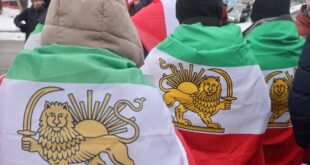MADRID (Reuters) — The United States told Iran on Thursday it must change its nuclear course or be isolated, but Tehran remained defiant despite the spectre of harsher sanctions as it held talks on its atomic work with the European Union.
US Secretary of State Condoleezza Rice said it was time for Iran to abandon uranium enrichment work. But EU foreign policy chief Javier Solana acknowledged before he met Iran’s top nuclear negotiator in Madrid it would be hard to clinch a deal.
“It is time for Iran to change its tactics. The international community is united on what Iran should do and this is to suspend (enrichment of uranium for nuclear fuel),” Rice said during a visit to Vienna.
Solana’s exploratory talks with Iran’s Ali Larijani on a former hunting estate outside Madrid looked like a last stab at easing the tense standoff before world powers sharpen UN sanctions.
But no one held out hope for a breakthrough compromise one month after the last inconclusive session between the two men.
“It is true that as time goes by, if the situation continues, probably the agreement will be more complicated,” Solana said before the talks. “I will try to … see if we can pave the way in order to get into formal negotiations.” After two hours of discussions, he and Larijani kept talking on a 45-minute walk in the estate gardens. Asked if the meeting had been constructive so far, Larijani told Reuters: “Yes, not bad.” Major powers insist Iran stop enriching uranium as a confidence-building precondition for negotiations on trade and other benefits offered to Tehran a year ago.
Larijani on Wednesday ruled out a complete nuclear halt as demanded by the UN Security Council, offering only to assure its programme is not a disguised bid for bombs as the West suspects. Iran says it wants atomic power for electricity only.
Foreign ministers of the Group of Eight top industrialised nations said on Wednesday Iran faced further sanctions after it failed not only to stop enriching by a UN deadline of May 24 but widened the disputed programme.
Enrichment is a process of refining uranium for power plants or, if taken to a very high degree, atomic bombs.
A report by the watchdog International Atomic Energy Agency (IAEA) last week laid bare how Iran was accelerating a campaign to install 3,000 enrichment centrifuges by mid-summer, laying a basis for “industrial-scale” fuel production.
Rice reiterated a US offer made one year ago that if Iran gave up uranium enrichment work, Washington was ready to reverse decades of American policy and talk to Tehran on any issue.
Solana’s spokeswoman said he was sticking to the Security Council’s “double suspension” formula — getting Iran to suspend enrichment in return for a suspension of sanctions and full negotiations, even though Iran has repeatedly spurned it.
“There doesn’t seem to be a lot of point to these talks, particularly on top of this negative IAEA report,” said another EU diplomat. “But the point is to keep the negotiating track open” to stem a feared slide into conflict.
There have been suggestions the West might settle for a partial enrichment halt to nudge Iran into negotiations.
Washington and key EU allies have publicly denied this, saying Iran would still be able to perfect enrichment technology with a limited centrifuge operation.
But some German officials have been privately receptive to a compromise with Iran, diplomats say. A diplomat with access to intelligence said an Iranian official would hold unannounced talks in Germany next week to get it to “lend support to an interim solution that would not include full suspension”.
A senior European official called the report credible.
Solana is empowered by the five permanent Security Council members — the United States, Russia, China, Britain and France — plus Germany and the EU to explore the scope for formal talks on a package of economic, technological and political initiatives if Iran shelves nuclear fuel production.
 Eurasia Press & News
Eurasia Press & News



